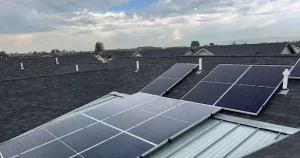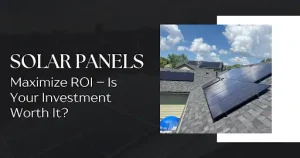Energy costs continue to rise, leaving homeowners and businesses grappling with hefty utility bills. The thought of being tied to fluctuating energy prices and non-renewable sources is frustrating. Imagine the relief of cutting down these expenses while contributing to a greener planet.
Investing in a solar power system could be the answer, offering not only environmental benefits but also significant financial returns. But is the ROI for solar panels in the U.S. really worth the investment? Let’s dive into the numbers and see if solar panels are the financial game-changer you need.
Understanding the Basics: What is Solar Panels ROI?
What Exactly is Solar Panels ROI?
Return on Investment (ROI) for solar panels is a metric that measures the financial returns you receive from your investment in a solar electric system. Simply put, it’s the amount of money saved on energy bills, compared to the initial cost of installing the solar power system.
Calculating the ROI involves assessing the upfront costs, ongoing maintenance, energy production, and potential savings over time. For many, the appeal lies in the prospect of reducing energy bills and, in some cases, even earning money by selling excess energy back to the grid.
Breaking Down the Investment: Costs and Savings
Initial Investment in a Solar Electric System
The initial cost of installing solar panels can be significant, often ranging from $15,000 to $25,000 depending on the size of the system, location, and type of panels. However, these costs can be offset by government incentives, tax credits, and rebates that make the investment more manageable.
Energy Savings and Payback Period
Once installed, solar panels begin generating electricity immediately, reducing reliance on the grid and lowering monthly utility bills. The average payback period for solar panels in the U.S. is between 6 to 10 years, after which the energy savings directly translate into ROI.
For example, if your system saves you $1,500 annually on electricity, and the system costs $15,000 after incentives, your payback period would be around 7-10 years. After this period, every dollar saved contributes to your ROI.
Selling Excess Energy

Many homeowners are surprised to learn that they can make money back on solar panels by selling excess energy to the grid. Through net metering programs, your solar power system can generate credits on your utility bill, further enhancing your ROI. This varies by state and utility company. Some utility companies offer different buyback rates and credits.
Factors Affecting Solar Panels ROI
Geographic Location and Sunlight Exposure
Your location plays a crucial role in determining how much sunlight your solar panels will receive and, consequently, how much energy they will produce. States with higher sunlight exposure, such as California, Arizona, and Florida, typically see a higher ROI for solar panels.
Energy Consumption and Utility Rates
If you consume a lot of electricity and live in an area with high utility rates, the savings from solar panels will be more significant, leading to a higher ROI. Conversely, if your energy consumption is low and utility rates are modest, the ROI may be lower, but still worth considering for long-term benefits.
Incentives and Rebates
Federal and state incentives can drastically reduce the upfront costs of solar panel installations. The federal solar tax credit, for example, allows you to deduct a percentage of your solar installation costs from your federal taxes, significantly improving your ROI.
Solar Panels: Are They Worth the Investment?
The question “Are solar panels worth it?” hinges on a combination of factors, including your financial situation, energy needs, and location. For most, the answer is a resounding yes. With decreasing installation costs, increasing utility rates, and the availability of incentives, the ROI for solar panels in the U.S. is compelling.
Beyond the financial benefits, there’s also the environmental impact to consider. Investing in solar panels contributes to reducing carbon emissions, promoting a cleaner, more sustainable future. So, when weighing the financial returns, don’t forget the environmental ROI, which adds intangible yet invaluable benefits.
Solar Panel Maintenance: A Quick Overview
Solar panels require minimal maintenance to keep them operating efficiently. Occasional cleaning and inspections are typically all that’s needed to ensure they continue to generate energy at optimal levels. Regular solar panel maintenance can help sustain the system’s performance and extend its lifespan, further enhancing your ROI.
Solar Panels – A Smart Investment for Your Future
Investing in a solar power system offers both financial and environmental benefits. The ROI for solar panels can be substantial, especially when you factor in energy savings, incentives, and the potential to sell excess energy back to the grid. While the initial costs may seem high, the long-term gains make solar panels worth the investment for many homeowners and businesses.
If you’re ready to take control of your energy costs and make a positive impact on the environment, consider investing in solar panels. Not only will you be reducing your utility bills, but you’ll also be contributing to a greener future. Start your solar journey and start saving!
FAQs on Solar Panels ROI
Is Solar a Good Return on Investment?
Yes, for many homeowners, solar panels offer a strong return on investment, especially when installed in areas with high utility rates and ample sunlight. The savings on energy bills, combined with incentives and the possibility of selling excess energy, make solar a financially sound decision for most.
Are Solar Panels Financially Worth It?
Solar panels are financially worth it for homeowners looking to reduce their energy bills and achieve long-term savings. With the potential to recover the initial investment within 6 to 10 years, and ongoing savings thereafter, solar panels are a viable investment for many.
Do You Save Money Going Solar?
Absolutely. By generating your electricity, you can significantly reduce or even eliminate your monthly utility bills. Over time, these savings add up, making the switch to solar a cost-effective choice.
Do You Make Money Back on Solar Panels?
Yes, in many cases, homeowners can make money back on solar panels by selling excess energy to the grid through net metering programs. This additional income stream can further boost your overall ROI.



